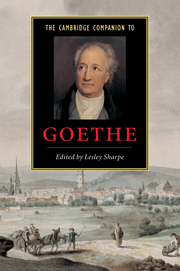Book contents
- Frontmatter
- Introduction
- 1 The world Goethe lived in
- 2 Goethe the writer and literary history
- 3 Goethe the poet
- 4 Goethe the dramatist
- 5 Faust
- 6 Weimar Classicism
- 7 Goethe and the Weimar theatre
- 8 Goethe’s prose fiction
- 9 Autobiographical writings
- 10 In defence of experience
- 11 Goethe and gender
- 12 Goethe and the visual arts
- 13 Goethe and the political world
- 14 Religion and philosophy
- 15 Reception in Germany and abroad
- A guide to further reading
- Index
7 - Goethe and the Weimar theatre
Published online by Cambridge University Press: 28 May 2006
- Frontmatter
- Introduction
- 1 The world Goethe lived in
- 2 Goethe the writer and literary history
- 3 Goethe the poet
- 4 Goethe the dramatist
- 5 Faust
- 6 Weimar Classicism
- 7 Goethe and the Weimar theatre
- 8 Goethe’s prose fiction
- 9 Autobiographical writings
- 10 In defence of experience
- 11 Goethe and gender
- 12 Goethe and the visual arts
- 13 Goethe and the political world
- 14 Religion and philosophy
- 15 Reception in Germany and abroad
- A guide to further reading
- Index
Summary
Goethe was Director of the Weimar Court Theatre from 1791 to 1817 and steered it from comparative insignificance to national importance, as a theatre where a repertoire of literary merit was combined with a style of playing predicated on a classical aesthetic. This style, in its decisive departure from the realistic tendencies of the contemporary German stage, aroused controversy and dissent, both in Goethe's day and after. Whether a rare flowering or a theatrical dead end, the Weimar theatre under Goethe, particularly during the years of collaboration with Schiller (1798-1805), was at the very least a highly significant experiment that raised the national level of debate about theatrical performance. Goethe's major plays were not, on the whole, written with the stage in mind, nor did he take on the directorship of the theatre in order to put them on the stage, for they formed only a tiny part of the repertoire. His concern was, within the constraints imposed by the means at his disposal, to bring to audiences the great plays of world literature in a vivid yet elevated style and thus take German theatre out of its provinciality.
German theatrical life underwent huge changes in the course of the eighteenth century. For the first half the commercial theatre with dedicated buildings hardly existed. Theatrical life was divided between the courts and the non-aristocratic sector. The former was served largely by French theatre companies and Italian opera companies, and there was only limited access for members of the bourgeoisie.
- Type
- Chapter
- Information
- The Cambridge Companion to Goethe , pp. 116 - 128Publisher: Cambridge University PressPrint publication year: 2002

